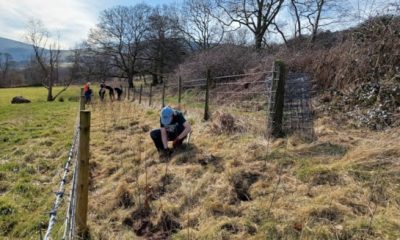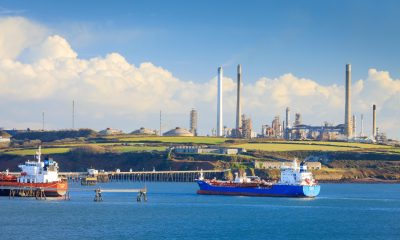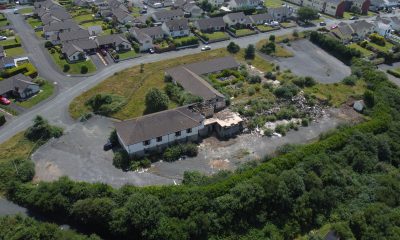News
Future for Wales: Navigating Major Climate Changes for Sustainability

Wales stands at a pivotal crossroads, facing the intricate dance of environmental challenges and the pressing need for resilient solutions. A narrative unfolds on the canvas of its rugged mountains, lush valleys, and vibrant communities—one of biodiversity loss, air quality concerns, and water scarcity paradoxes.
This discourse delves into the heart of Wales, exploring the paths towards a harmonious coexistence between nature and human activity, envisioning cleaner air, responsible water usage, and a thriving environment for generations to come.
In the same spirit of enlightenment, we also direct learners on the right path to achieve academic excellence. You can connect with professionals by asking a simple question like who can write my paper. This guides you to renowned academicians to offer the support you need to attain your academic goals.
Sea Level Rise
With its picturesque coastline, Wales is under the looming threat of rising sea levels, putting coastal communities and delicate ecosystems at risk. The urgent need for strategic investments in sustainable coastal defenses cannot be overstated. This involves constructing physical barriers and adopting innovative solutions, such as natural coastal buffers and resilient infrastructure.
Furthermore, integrating sea-level rise projections into land-use planning is critical. This forward-thinking approach ensures a resilient and adaptive strategy, steering Wales away from potential environmental and societal upheaval.
Extreme Weather Events
Wales experiences a heightened vulnerability to extreme weather events due to climate change that demands immediate attention. The increasing frequency and intensity of floods and storms pose a clear and present danger. Strengthening infrastructure resilience goes beyond traditional methods, requiring innovative solutions such as smart infrastructure and climate-resilient urban planning.
Additionally, the implementation of early warning systems is imperative. Educating communities on emergency preparedness empowers them to mitigate risks and fosters a culture of resilience, ensuring effective responses to the unpredictable nature of weather patterns.
Biodiversity Loss
Picture Wales as a living canvas, where rugged mountains and lush valleys tell a story of nature’s artistry. Yet, this masterpiece faces a heartbreaking threat – biodiversity loss. It’s not just the vanishing act of species; it’s the unraveling of the intricate web that breathes life into these landscapes. Urgency becomes our brush, painting a new narrative through protected areas, conservation programs, and a steadfast commitment to sustainable land-use practices. This isn’t merely about saving species; it’s about preserving the very heartbeat of Wales, nurturing an environment where nature and human activity dance harmoniously.
Air Quality
Imagine the air over Wales as a delicate melody, each breath composing a note in the symphony of life. Yet, this harmony is endangered as the balance of air quality teeters. We embark on a journey to reclaim this melody, transitioning to renewable energy sources as the first verse. It’s more than infrastructure – it’s a commitment to cleaner tunes, with research and development as our musical instruments.
Incentivizing businesses becomes the bridge, harmonizing eco-friendly practices into the composition. Public transportation should be the solution. This reduces noise of individual vehicles to promote cleaner, healthier air. Strict regulations then stand as the conductor, ensuring every breath in Wales resonates with the melody of a cleaner, brighter future.
Water Scarcity

A paradox unfolds in the heart of Wales’ lush landscapes – water scarcity amidst abundance. It’s a challenge echoing through valleys and fields, touching agriculture and communities. As stewards of this paradox, our responsibility is clear. We weave a tale of water conservation, each chapter a lesson in promoting efficient irrigation practices, investing in water management infrastructure, and advocating for sustainable agriculture.
Imagine this narrative as a river flowing towards responsible water usage, safeguarding this vital resource. We inscribe resilience into Wales with every ripple, ensuring that the paradox becomes a testament to responsible custodianship for generations.
Carbon Emissions
The battle against climate change requires Wales to take a proactive stance in reducing carbon emissions. Enforcing policies that limit emissions from industries involves a delicate balance – encouraging economic growth while prioritizing environmental sustainability. Incentivizing the adoption of renewable energy is not just about meeting targets but embracing a cleaner, more sustainable energy future.
Equally important is encouraging energy-efficient practices in households, promoting a culture of environmental responsibility at the grassroots level. By embracing these sustainable alternatives, Wales can position itself as a beacon of change in the global fight against climate change.
Deforestation
Due to deforestation, Wales’ lush forests, vital to its ecosystems and biodiversity, face a precarious future. Stricter enforcement of anti-logging regulations is the need of the hour. Beyond prevention, promoting reforestation initiatives becomes vital, reclaiming lost habitats and sequestering carbon.
Advocacy for sustainable forestry practices completes this trinity of action. By taking these steps, Wales protects its natural habitats and actively contributes to the overall health and balance of its environment, ensuring a thriving coexistence between its people and the diverse flora and fauna.
Waste Management
Wales grapples with the environmental repercussions of improper waste management, requiring a nuanced and comprehensive strategy. Beyond traditional waste reduction and recycling programs, embracing the circular economy becomes paramount. This involves reimagining the lifecycle of products, minimizing waste, and maximizing resource efficiency.
Simultaneously, discouraging single-use plastics through regulations and widespread awareness campaigns is essential. By adopting responsible waste practices, Wales addresses the immediate environmental impact and pioneers a path towards a cleaner and more sustainable future.
Agricultural Practices
As the backbone of Wales, the agricultural sector holds a pivotal role, but not without its environmental challenges. Encouraging sustainable farming methods involves supporting farmers in adopting practices prioritizing productivity and environmental health.
This includes promoting organic agriculture, which reduces reliance on synthetic inputs and fosters soil health. Supporting farmers in transitioning to eco-friendly practices is vital in ensuring a harmonious balance between agricultural productivity and environmental preservation. Through this approach, Wales can sustain its agricultural heritage while safeguarding the natural resources that underpin it.
Conclusion
As we conclude this exploration of sustainable futures for Wales, do not forget to advance your education to support such programs.
You are the master of your academics, but when you need help, do not hesitate to ask experts. The right question is, who can write my paper for me? This allows you to connect with industry experts to offer professional assistance.
Through urgent conservation efforts, commitment to cleaner air, and responsible water stewardship, Wales emerges as a witness to change and an active participant in crafting its destiny.
The harmonious coexistence of nature and human activity becomes not merely an aspiration but a tangible goal. With each step towards sustainable practices, Wales strides confidently into a future where its landscapes flourish, its air resonates with purity, and its communities stand united as stewards of a resilient and thriving environment.
Crime
Former police superintendent dismissed for gross misconduct

Misogynistic behaviour spanned three years, hearing told
A FORMER senior officer has been dismissed from Dyfed-Powys Police following a gross misconduct hearing which found he had engaged in inappropriate and misogynistic behaviour towards female colleagues.
Gary Davies, who held the rank of Superintendent, had been suspended since July 2022 while an investigation was carried out into a series of allegations relating to his conduct between 2017 and 2020.
A Gross Misconduct Hearing was held at Dyfed-Powys Police Headquarters between 24 March and 4 April 2025. The hearing was chaired by Legally Qualified Chair, Mr Oliver Thorne.
The panel found that Davies had breached multiple standards of professional behaviour, including Authority, Respect and Courtesy, Discreditable Conduct, and Equality and Diversity. As a result, he has been dismissed from the force and placed on the College of Policing Barred List, which prevents him from returning to the police service.
Deputy Chief Constable Ifan Charles, who serves as the Appropriate Authority for complaints and misconduct within Dyfed-Powys Police, issued a formal statement following the outcome.
He said:
“Dyfed-Powys Police expects the highest standards of professional behaviour from its officers and staff, both on and off duty – and especially from those in senior leadership roles.
“I apologise to the former and current officers and staff who were subjected to inappropriate behaviour by former Superintendent Gary Davies, and I thank them for their courage in coming forward.
“Over the past two weeks, we have heard accounts from a number of colleagues, the majority of whom are women, who experienced unacceptable misogynistic conduct during the course of their duties.
“They are role models, and I commend the integrity and bravery they have shown throughout this process.
“This case is deeply concerning and will understandably cause unease within the organisation. I want to reassure all staff and the wider public that immediate action was taken when allegations were made, and the matter has been treated with the utmost seriousness.
“The outcome of today’s hearing reflects our commitment to maintaining the highest standards of conduct in policing. We will continue to use all available measures to ensure those unfit to hold the office of constable are removed swiftly and efficiently.”
Davies’s name was officially added to the Barred List on Friday (Apr 4), the day the hearing concluded.
Community
Inspiring a love of reading with local authors

THE PEMBROKESHIRE LIBRARY SERVICE recently took part in the Books Council of Wales ‘Stars of the Shelves’ Initiative – to bring school children into libraries to meet local authors.
Grant funded by Welsh Government, the initiative aims to engage primary school pupils with literature and reading through author-led sessions in local libraries.
Pembroke Dock, Narberth, Milford Haven and Fishguard Libraries all took part and welcomed around 200 children at various sessions during March.
Welsh authors Kerry Curson and Rebecca F John were commissioned to deliver the workshops which were a fantastic chance for learners to interact with professional writers, explore storytelling and foster a love for reading and writing.
Pembroke Dock Community School and Narberth CP School enjoyed “fun”, “interesting” and “inspirational” workshops with Kerry where the pupils created their own stories, learned new vocabulary and felt more confident about their writing afterwards.
St Francis Catholic School, Ysgol Glannau Gwaun and Ysgol Wdig enjoyed hearing about Rebecca’s books and inspiration as well as taking part in the creative writing process and character development exercises and several found themselves wanting to read more.
Cabinet Member for Residents’ Services Cllr Rhys Sinnett said: “Our libraries are more than just places to borrow books and this Books Council of Wales initiative is just one example of the importance of libraries in the community.
“There was overwhelmingly positive feedback from the pupils who took part, and it is fantastic to see our young people fostering enthusiasm for reading and writing.”
Tracey Johnson, Site Coordinator for Fishguard, Newport and St Davids libraries, liaised with the Books Council of Wales and the authors, to organise the timetable of visits.
She added: “It was great to see so many primary age children in our libraries, enjoying themselves and learning in a fun way.
“It’s really important that we help develop the ‘library habit’ of visiting regularly, to help encourage a love of reading from an early age. Libraries are free to join, and library staff are here to help children and parents who visit.”
News
Neyland councillor threatens legal action under Equalities Act

NEYLAND TOWN COUNCIL is once again under scrutiny following a strongly worded letter from Councillor David Devauden, who has accused the Town Clerk of discrimination and threatened multiple legal actions.

In an email sent to fellow councillors and members of the public on Tuesday (Apr 1), Cllr Devauden alleges breaches of the Equalities Act 2010, as well as libel and harassment, in connection with ongoing disputes within the council.
Claims of discrimination and legal threats
The email alleges that the Town Clerk, Libby Matthews, has engaged in what Cllr Devauden describes as “the illegal practice of discrimination” against himself and fellow councillors Brian Rothero and Steve Thomas. He claims the Clerk has refused to respond to correspondence and has shown bias in favour of certain councillors.
“This is called OPENNESS, something we, as a Council, were proud to proclaim but failed to act on,” he wrote.
Drawing on his past experience as a part-time paralegal, Cllr Devauden stated he specialised in libel and discrimination law and accused the Clerk of misandry and malicious communications. He claims the complaints against him lacked evidence and were nothing more than “a misandristic rant.”
Ultimatum to Clerk
Cllr Devauden issued a 48-hour ultimatum to Libby Matthews, demanding her resignation “with no compensation and no benefits.” He warned that if she did not comply, he would pursue a case under the Equalities Act 2010 and other legislation.
“If you resign immediately then I will cease taking legal action against the Council,” he stated, though he added he could not guarantee the same for civil proceedings relating to social media posts alleging sexual harassment and excessive email communications.
He also warned of intended complaints to police under the Malicious Communications Act 1988 and the Protection from Harassment Act 1997, and stated his intention to pursue a libel case under the Human Rights Act 1998 if the allegations made against him are not substantiated with evidence.
Tensions continue to mount
The letter follows weeks of controversy surrounding the council, including the co-option of the Clerk’s mother to the council, accusations of secrecy, and increasing public dissatisfaction with council leadership.
As of now, the Town Clerk has not publicly responded to the letter.
Upcoming tribunal
The Pembrokeshire Herald has found that Cllr David Devauden is due to face a tribunal under reference APW/005/2024-025/CT, brought by the Adjudication Panel for Wales.
The hearing relates to alleged breaches of paragraphs 4(b), 4(c), 6(1)(a), 6(1)(d), and 6(2) of the Code of Conduct, which outline the following responsibilities:
- 4(b): Councillors must show respect and consideration for others.
- 4(c): Councillors must not use bullying behaviour or harass any person.
- 6(1)(a): Councillors must not conduct themselves in a manner likely to bring their office or authority into disrepute.
- 6(1)(d): Councillors must not disclose confidential information contrary to legal or policy obligations.
- 6(2): Councillors must not make vexatious, malicious or frivolous complaints against others.
The relevant authority is Neyland Town Council. Further details about the hearing are expected to be released in due course.
More referrals expected
A source close to the council has indicated that further referrals to the Adjudication Panel for Wales may be forthcoming, although this has not yet appeared on the public tribunal list.
Former councillor Andrew Lye also stated he has made a police complaint regarding what he describes as bullying by Cllr Devauden. He has expressed frustration over a lack of response from Dyfed-Powys Police and is considering referring the force to the Ombudsman over their handling of the complaint.
The Pembrokeshire Herald will continue to monitor developments and report on the outcome of any legal action or council response.
-

 Crime7 days ago
Crime7 days agoPembroke Dock man to be sentenced for assaulting police officers
-

 Crime7 days ago
Crime7 days agoMilford Haven man faces court hearing for assault on three police officers
-

 Health7 days ago
Health7 days agoSenedd backs ‘buy-one-get-one-free’ ban amid obesity crisis
-

 Charity6 days ago
Charity6 days agoEmergency services unite for charity at Pembroke Dock Fire Station
-

 Community7 days ago
Community7 days agoSwimming Pool at Carmarthen Leisure Centre to close for essential repairs
-

 Sport6 days ago
Sport6 days agoKildunne hat-trick rips Wales apart in record-breaking Six Nations clash
-

 Community6 days ago
Community6 days agoTenby comes alive with eccentricity as Steampunk Festival returns in style
-

 Business7 days ago
Business7 days agoTree-mendous work helping to improve the condition of our rivers






























